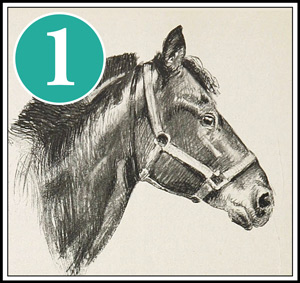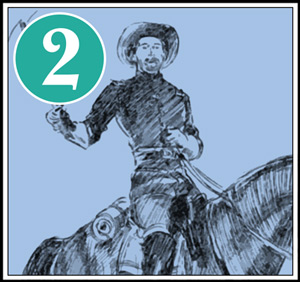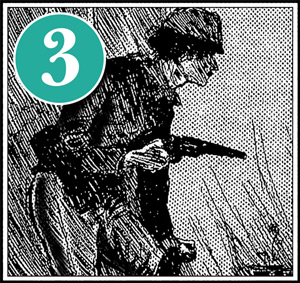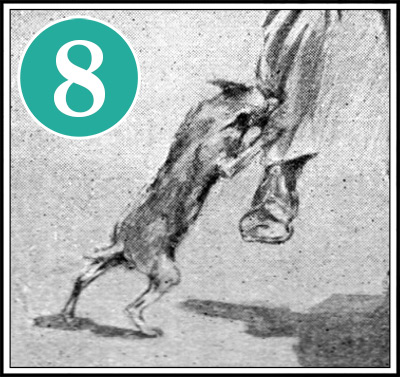
Death Comes to Cat Alley
Episode 8 •
Death Comes to Cat Alley
• Cat Alley is a back-yard illustration of the theory of evolution. The fittest survive, and the Welsh babies were not among them.
Podcast: Play in new window | Download
Subscribe: Apple Podcasts | Google Podcasts | Email | TuneIn | RSS

SHOW NOTES ____________
The Making of an American (excerpt from chapter 3)
By Jacob Riis
All my money was gone, and an effort I made to join a railroad gang in the Spuyten Duyvil cut came to nothing. Again I reenforced my credit with my revolver and the everlasting top-boots, but the two or three dollars they brought at the pawnshop were soon gone, and once more I was turned out in the street. It was now late in the fall. The brick-making season was over. The city was full of idle men. My last hope, a promise of employment in a human-hair factory, failed, and, homeless and penniless, I joined the great army of tramps, wandering about the streets in the daytime with the one aim of somehow stilling the hunger that gnawed at my vitals, and fighting at night with vagrant curs or outcasts as miserable as myself for the protection of some sheltering ash-bin or doorway.
I was too proud in all my misery to beg. I do not believe I ever did. But I remember well a basement window at the down-town Delmonico’s, the silent appearance of my ravenous face at which, at a certain hour in the evening, always evoked a generous supply of meat-bones and rolls from a white-capped cook who spoke French. That was the saving clause. I accepted his rolls as instalments of the debt his country owed me, or ought to owe me, for my unavailing efforts in its behalf.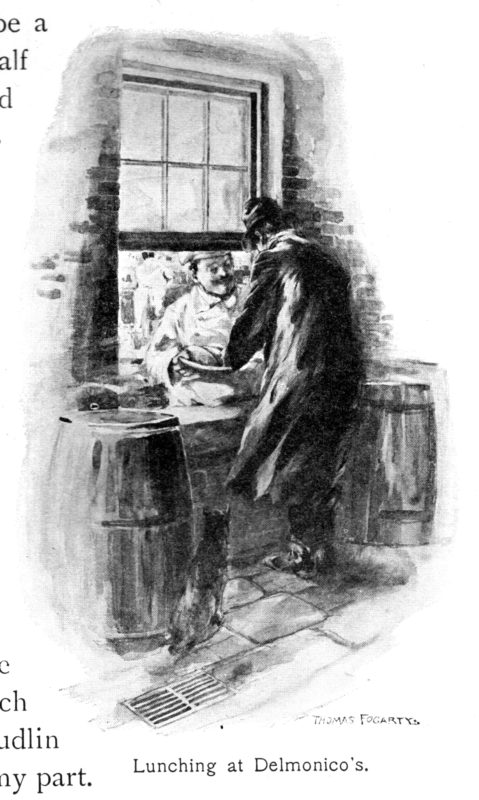
It was under such auspices that I made the acquaintance of Mulberry Bend, the Five Points, and the rest of the slum, with which there was in the years to come to be a reckoning. For half a lifetime afterward they were my haunts by day and by night, as a police reporter, and I can fairly lay claim, it seems to me, to a personal knowledge of the evil I attacked. I speak of this because, in a batch of reviews of “The Battle with the Slum.” which came yesterday from my publishers to me there is one which lays it all to “maudlin sensitiveness” on my part.
“The slum,” says this writer, “is not at all so unspeakably vile,” and measures for relief based on my arraignment “must be necessarily abortive.” Every once in a while I am asked why I became a newspaper man. For one thing, because there were writers of such trash, who, themselves comfortably lodged, have not red blood enough in their veins to feel for those to whom everything is denied, and not sense enough to make out the facts when they see them, or they would not call playgrounds, schoolhouses, and better tenements “abortive measures.”
Some one had to tell the facts; that is one reason why I became a reporter. And I am going to stay one until the last of that ilk has ceased to discourage men from trying to help their fellows by the shortest cut they can find, whether it fits in a theory or not. I don’t care two pins for all the social theories that were ever made unless they help to make better men and women by bettering their lot. I have had cranks of that order, who rated as sensible beings in the ordinary affairs of life, tell me that I was doing harm rather than good by helping improve the lot of the poor; it delayed the final day of justice we were waiting for. Not I. I don’t propose to wait an hour for it, if I can help bring it on; and I know I can.
There! I don’t believe I have read fifteen reviews of any of my books. Life is too short; but I am glad I did not miss that one. Those are the fellows for whom Roosevelt is not a good enough reformer; who chill the enthusiasm of mankind with a deadly chill, and miscall it method—science. The science of how not to do a thing—yes! They make me tired.
There was until last winter a doorway in Chatham Square, that of the old Barnum clothing store, which I could never pass without recalling those nights of hopeless misery with the policeman’s periodic “Get up there! move on!” reenforced by a prod of his club or the toe of his boot. I slept there, or tried to when crowded out of the tenements in the Bend by their utter nastiness. Cold and wet weather had set in, and a linen duster was all that covered my back. There was a woollen blanket in my trunk which I had from home—the one, my mother had told me, in which I was wrapped when I was born; but the trunk was in the “hotel” as security for money I owed for board, and I asked for it in vain.
I was now too shabby to get work, even if there had been any to get. I had letters still to friends of my family in New York who might have helped me, but hunger and want had not conquered my pride. I would come to them, if at all, as their equal, and, lest I fall into temptation, I destroyed the letters. So, having burned my bridges behind me, I was finally and utterly alone in the city, with the winter approaching and every shivering night in the streets reminding me that a time was rapidly coming when such a life as I led could no longer be endured.
Not in a thousand years would I be likely to forget the night when it came. It had rained all day, a cold October storm, and night found me, with the chill downpour unabated, down by the North River, soaked through and through, with no chance for a supper, forlorn and discouraged. I sat on the bulwark, listening to the falling rain and the swish of the dark tide, and thinking of home.
How far it seemed, and how impassable the gulf now between the “castle” with its refined ways, between her in her dainty girlhood and me sitting there, numbed with the cold that was slowly stealing away my senses with my courage. There was warmth and cheer where she was. Here—An overpowering sense of desolation came upon me, I hitched a little nearer the edge. What if—? Would they miss me much or long at home if no word came from me? Perhaps they might never hear. What was the use of keeping it up any longer with, God help us, everything against and nothing to back a lonely lad?
And even then the help came. A wet and shivering body was pressed against mine, and I felt rather than heard a piteous whine in my ear. It was my companion in misery, a little outcast black-and-tan, afflicted with fits, that had shared the shelter of a friendly doorway with me one cold night and had clung to me ever since with a loyal affection that was the one bright spot in my hard life.
As my hand stole mechanically down to caress it, it crept upon my knees and licked my face, as if it meant to tell me that there was one who understood; that I was not alone. And the love of the faithful little beast thawed the icicles in my heart. I picked it up in my arms and fled from the tempter; fled to where there were lights and men moving, if they cared less for me than I for them—anywhere so that I saw and heard the river no more.
In the midnight hour we walked into the Church Street police station and asked for lodging. The rain was still pouring in torrents. The sergeant spied the dog under my tattered coat and gruffly told me to put it out, if I wanted to sleep there. I pleaded for it in vain. There was no choice. To stay in the street was to perish. So I left my dog out on the stoop, where it curled up to wait for me. Poor little friend! It was its last watch. The lodging-room was jammed with a foul and stewing crowd of tramps. A loud-mouthed German was holding forth about the war in Europe, and crowding me on my plank.
Cold and hunger had not sufficed to put out the patriotic spark within me. It was promptly fanned into flame, and I told him what I thought of him and his crew. Some Irishmen cheered and fomented trouble, and the doorman came in threatening to lock us all up. I smothered my disgust at the place as well as I could, and slept, wearied nearly to death.
In the middle of the night I awoke with a feeling that something was wrong. Instinctively I felt for the little gold locket I wore under my shirt, with a part of the precious curl in it that was my last link with home. It was gone. I had felt it there the last thing before I fell asleep. One of the tramp lodgers had cut the string and stolen it.
With angry tears I went up and complained to the sergeant that I had been robbed. He scowled at me over the blotter, called me a thief, and said that he had a good mind to lock me up. How should I, a tramp boy, have come by a gold locket? He had heard, he added, that I had said in the lodging-room that I wished the French would win, and he would only be giving me what I deserved if he sent me to the Island. I heard and understood. He was himself a German. All my sufferings rose up before me, all the bitterness of my soul poured itself out upon him. I do not know what I said. I remember that he told the doorman to put me out. And he seized me and threw me out of the door, coming after to kick me down the stoop. My dog had been waiting, never taking its eyes off the door, until I should come out. When it saw me in the grasp of the doorman, it fell upon him at once, fastening its teeth in his leg. He let go of me with a yell of pain, seized the poor little beast by the legs, and beat its brains out against the stone steps.
At the sight a blind rage seized me. Raving like a madman, I stormed the police station with paving-stones from the gutter. The fury of my onset frightened even the sergeant, who saw, perhaps, that he had gone too far, and he called two policemen to disarm and conduct me out of the precinct anywhere so that he got rid of me. They marched me to the nearest ferry and turned me loose. The ferry-master halted me. I had no money, but I gave him a silk handkerchief, the last thing about me that had any value, and for that he let me cross to Jersey City. I shook the dust of New York from my feet, vowing that I would never return, and, setting my face toward the west, marched straight out the first railroad track I came to.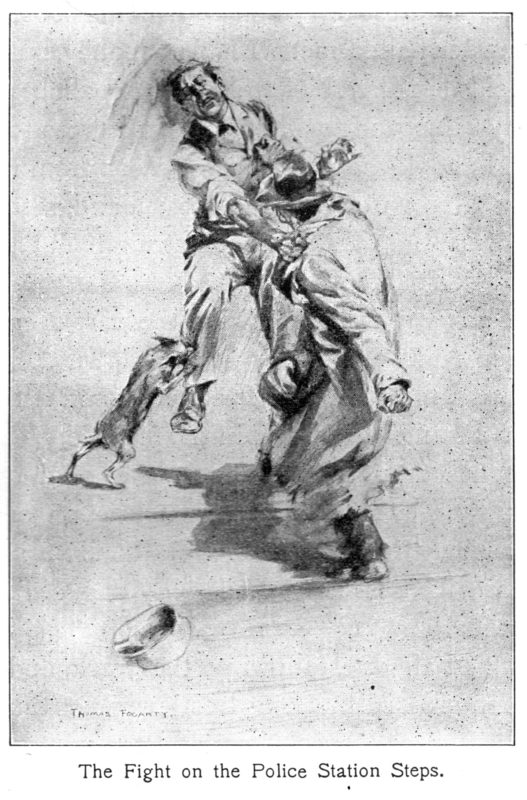
And now, right here, begins the part of my story that is my only excuse for writing down these facts, though it will not appear for a while yet. The outrage of that night became, in the providence of God, the means of putting an end to one of the foulest abuses that ever disgraced a Christian city, and a mainspring in the battle with the slum as far as my share in it is concerned.
My dog did not die unavenged.
Death Comes to Cat Alley
The dead-wagon stopped at the mouth of Cat Alley. Its coming made a commotion among the children in the block, and the Chief of Police looked out of his window across the street, his attention arrested by the noise. He saw a little pine coffin carried into the alley under the arm of the driver, a shoal of ragged children trailing behind. After a while the driver carried it out again, shoved it in the wagon, where there were other boxes like it, and, slamming the door, drove off.
A red-eyed woman watched it down the street until it disappeared around the corner. Then she wiped her eyes with her apron and went in.
It was only Mary Welsh’s baby that was dead, but to her the alley, never cheerful on the brightest of days, seemed hopelessly desolate to-day. It was all she had. Her first baby died in teething.
Cat Alley is a back-yard illustration of the theory of evolution. The fittest survive, and the Welsh babies were not among them. It would be strange if they were. Mike, the father, works in a Crosby-street factory when he does work. It is necessary to put it that way, for, though he has not been discharged, he had only one day’s work this week and none at all last week. He gets one dollar a day, and the one dollar he earned these last two weeks his wife had to draw to pay the doctor with when the baby was so sick. They have had nothing else coming in, and but for the wages of Mrs. Welsh’s father, who lives with them, there would have been nothing in the house to eat.
The baby came three weeks ago, right in the hardest of the hard times. It was never strong enough to nurse, and the milk bought in Mulberry street is not for babies to grow on who are not strong enough to stand anything. Little John never grew at all. He lay upon his pillow this morning as white and wan and tiny as the day he came into a world that didn’t want him.
Yesterday, just before he died, he sat upon his grandmother’s lap and laughed and crowed for the first time in his brief life, “just like he was talkin’ to me,” said the old woman, with a smile that struggled hard to keep down a sob. “I suppose it was a sort of inward cramp,” she added—a mother’s explanation of baby laugh in Cat Alley.
The mother laid out the little body on the only table in their room, in its only little white slip, and covered it with a piece of discarded lace curtain to keep off the flies. They had no ice, and no money to pay an undertaker for opening the little grave in Calvary, where their first baby lay. All night she sat by the improvised bier, her tears dropping silently.
When morning came and brought the woman with the broken arm from across the hall to sit by her, it was sadly evident that the burial of the child must be hastened. It was not well to look at the little face and the crossed baby hands, and even the mother saw it.
“Let the trench take him, in God’s name; he has his soul,” said the grandmother, crossing herself devoutly.
An undertaker had promised to put the baby in the grave in Calvary for twelve dollars and take two dollars a week until it was paid. But how can a man raise two dollars a week, with only one coming in in two weeks, and that gone to the doctor? With a sigh Mike Welsh went for the “lines” that must smooth its way to the trench in the Potter’s Field, and then to Mr. Blake’s for the dead-wagon. It was the hardest walk of his life.
And so it happened that the dead-wagon halted at Cat Alley and that little John took his first and last ride. A little cross and a number on the pine box, cut in the lid with a chisel, and his brief history was closed, with only the memory of the little life remaining to the Welshes to help them fight the battle alone.
In the middle of the night, when the dead-lamp burned dimly at the bottom of the alley, a policeman brought to Police Headquarters a wailing child, an outcast found in the area of a Lexington-avenue house by a citizen, who handed it over to the police. Until its cries were smothered in the police nursery up-stairs with the ever-ready bottle, they reached the bereaved mother in Cat Alley and made her tears drop faster. As the dead-wagon drove away with its load in the morning, Matron Travers came out with the now sleeping waif in her arms. She, too, was bound for Mr. Blake’s.
The two took their ride on the same boat—the living child, whom no one wanted, to Randall’s Island, to be enlisted with its number in the army of the city’s waifs, strong and able to fight its way; the dead, for whom a mother’s heart yearns, to its place in the great ditch.
• • • • • • • • • • • • • • • • • • • • • • • • • • • • • •
By subscribing, you will automatically receive the latest episodes downloaded to your computer or portable device. Select your preferred subscription method above.
To subscribe via a different application: Go to your favorite podcast application or news reader and enter this URL: https://clearwaterpress.com/byline/feed/podcast/

